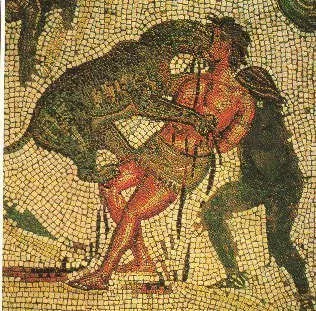At the time of Placidius Vorenus, the faith of the Galilean had so well taken root inside Rome that half of the servitors of the imperial palace followed his creed.

Of course, no Galilean was crazy enough to claim his faith in the open, so Placidius Vorenus realized it only the day when, drunk with wine and anger, he beat a cup-bearer to a breath of his life. This cup-bearer turned out to be a Galilean, and his colleagues decided to protest. The day after the incident, half of the palace's staff didn't appear to show their revulsion at the treatment of their colleague.
Furious and somewhat worried, Vorenus summoned the chief of the Galilean to give him an earful. The Galilean listened calmly, but when the Emperor eventually asked him to order his men to come back to the palace, he politely refused. He would not order them to come back at the service of such a violent man.
-Do you think I am a violent man? Or that this office makes me a violent man? Do you think you could do better than me, Galilean? exploded the Emperor.
-With the help of God, replied the Galilean, yes, I do.
-In this case, I dare you to hold this office for two months!
The Galilean argued that he could not do it. Who would sheperd his men meanwhile? The Emperor smiled and said that he would.
Vorenus and the Galilean chief exchanged their clothes. They looked alike so much that no one noticed anything. Vorenus, as the Galilean-in-chief, came back to the waiting servitors and told them that he had reasoned the Emperor and that he would welcome them back without any retaliation!
-Even better! exclaimed Voremus. I convinced him, as an apology, to double your wages! And from now on, all servitors of the palace must be Galileans!
They cheered him and came back to work as usual the day after. When the Galilean-in-chief, now Emperor, got wind of all that "he" had promised, he swallowed hard and did as best as he could.
Placidius Vorenus realized that he enjoyed being in charge of the souls of people, more than the bodies. He loved to preach and to write grandiose speeches. He discovered it was easier to light the hearts of the people with saintly words than the heads of the soldiers and senators with words like "duty" and "honours".
The Galilean, him, grew every day more weary and anxious about the intricacies of the daily grind of a government structure. He tried to reason with Senators, to argue with soldiers, to plead with legal officiers and failed.
Well before the end of the two months, their trajectories met again. Under Placidius Vorenus, the Galileans professed their faith in the open, with such impudence that many voices started to complain against the disrespect these monotheists showed the Empire. After all, the Galileans were nothing more than tolerated. It was as if one of them was seating - god forbid! - in the throne room!
It escalated in such a way that the Emperor had to ask the Galileans to keep it down. It just fanned the flames. Riots broke out. Legions were summoned and during three days and three nights skirmishes and bloodshed ran through the city, until eventually the Galilean in chief was arrested, chained and thrown at the feet of the Emperor.
-So, said Placidius Vorenus, in rags, his hands tied behind his back, do you still believe you can rule with clemency?
-You tricked me, Roman! Take back your crown, and give me back mine! Let me go back to my flock!
There was such despair in the voice of the Galilean-turned-Emperor, that Placidius Vorenus knew he had won.
-Do you really think they would take you back, those you have butchered in such a way?
The Galilean knew he was right. He had no choice.
With three thousands prisoners of his faith, Placidius Vorenus was thrown to the lions. He supported his martyr with such stoicism that he was instantly sanctified.
The Emperor kept unleashing the purges on the Galileans with such a fury that it looked like something personal. For every Galilean, this man was the image of the Antichrist.
Eventually, when he died, two years later, the tattoo of a cross on his chest revealed him for who he really was. The Senate decided to hush the scandal as best as it could.
To this day, no one knows if that bloodthirsty tyrant, in his determination to uproot the Galilean faith with such bloodlust, was successful in delaying the triumph of the faith by fifty years or if he accelerated it by the same amount of time.